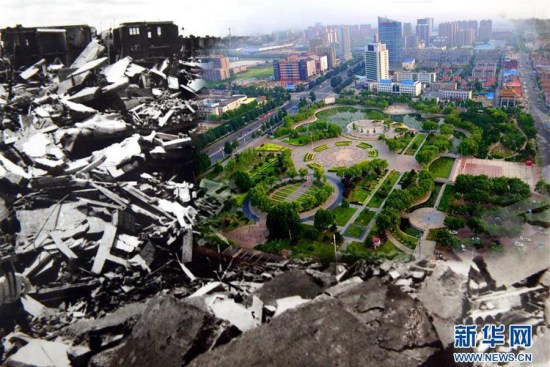
The black-and-white photo shows how the catastrophic earthquake turned Tangshan into ruins on July 28, 1976, while the colored part shows the Yuntian Square on July 18, 2016. (Photo/Xinhua)
Even though Yang Zhensheng has no memories of his own of the earthquake that flattened his hometown shortly before his birth, the disaster will forever be part of his life -- he is named after it.
In his given name, "zhen" means earthquake and "sheng" means birth. He was the first baby born in the rubble of Tangshan, a city that lies more than 150 kilometers to the southwest of Beijing, after the 7.8-magnitude event which claimed more than 242,000 lives on July 28, 1976.
Chinese parents commonly mark historical events in the names of their children, and many of those who will soon turn 40 have the Chinese character "zhen" in their given names. Zhensheng and Kangzhen (quake resistant) are among the most common.
"We didn't experience the horror ourselves, but it left a permanent mark on us," Yang said.
Perhaps due to his link to the disaster, after graduation Yang went to work in the local civil affairs bureau, the department in charge of disaster relief, and has been head of the Tangshan sanatorium for paraplegia for 11 years.
The powerful earthquake 40 years ago left 3,817 survivors paraplegic, more than 800 of whom are still alive. In the sanatorium, patients receive free treatment, food and accommodation, as well as living allowance.
"Born the day of the tragedy. I'm happy to care for them," Yang said.
AS THE FISH LOVES THE WATER
At noon on Aug. 4, Yu Fengrong gave birth to a daughter in a temporary shack, not long after she was pulled from the debris. She still remembers her misery as, without even the most basic necessities, she held her baby and wept as rain poured through the roof. The desperate mother felt a small measure of relief to see soldiers arrive with hot porridge and boiled eggs -- the traditional food for new Chinese mothers.
For the next month, the soldiers helped the family through their hardest of times, visiting them nearly every day with milk powder, noodles and anything else they could find.
Yu Fengrong and her husband Yu Zhanshui showed their gratitude to their saviors in the name of their daughter, Yu Shuiqing.
The pronunciation of her name is the same as the Chinese idiom to mean literally "the affection between fish and water," which is usually used to describe the rapport between the military and civilians.
SHANGHAI SURPRISE
Also on Aug.4, Sun Hu was delivered in a tent without water or electricity by Dr. Zhou Juanhua, a member of a rescue team sent by a Shanghai hospital.
Sun's mother had a difficult labor, and Zhou knelt on the ground for seven hours to deliver the baby.
Sun was given the name "Hu," the abbreviation for Shanghai, the commercial and financial hub on the east China coast, to express admiration for the woman doctor.
THE LESSON OF HISTORY
The children of the Tangshan earthquake, born among the rubble and squalor, have been taught the true meaning of gratitude by their parents.
Following the catastrophic Wenchuan earthquake in southwest China's Sichuan Province in 2008, more than 270 Tangshan people named Zhensheng or Kangzhen together visited the Tangshan quake monument in downtown Tangshan, Hebei Province, and made donations for the victims in Sichuan.
"We can't just sit idly by. It was only through the kindness of people all over the country that we are alive today," Yang said.


















































